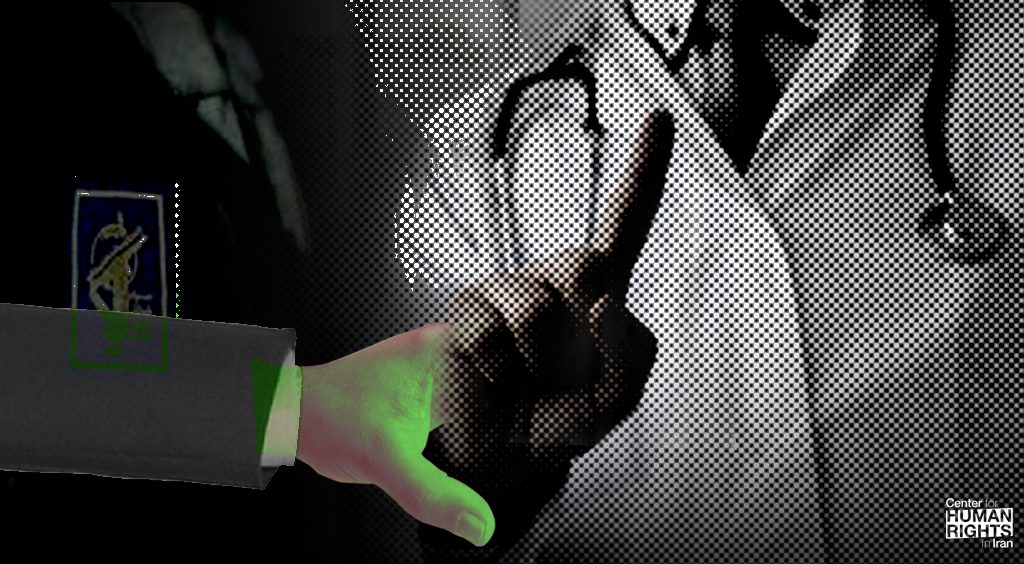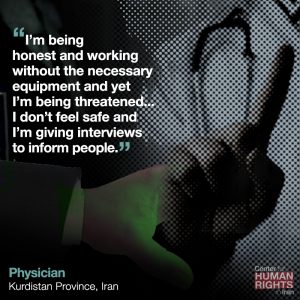Doctors Punished for Contradicting Iran’s Official Line on COVID-19
 Physicians in Iran including university officials have been reprimanded including by way of prosecution for publicizing information about the country’s COVID-19 outbreak that contradicts officials’ statements, the Center for Human Rights in Iran (CHRI) has learned.
Physicians in Iran including university officials have been reprimanded including by way of prosecution for publicizing information about the country’s COVID-19 outbreak that contradicts officials’ statements, the Center for Human Rights in Iran (CHRI) has learned.
Iran’s Health Ministry had reported 74,877 confirmed cases of the novel coronavirus COVID-19 and 4,683 deaths at the time of this writing on April 14, 2020. Yet medical experts inside and outside the country have argued that the actual numbers could be much higher.
Most recently, a footnote in a report by the Iranian Parliamentary Research Center published on April 14—three days after the economy was partially reopened by President Hassan Rouhani—stated that the actual number of deaths could be 0.8 times higher than the government’s official tally and that the number of infections could be 8-10 times higher.
Among those who’ve doubted the government’s official numbers is Dr. Rahim Yousefpour, a physician in the city of Saqqez, Kurdistan Province, who is being prosecuted for publicly stating that he believes the number of fatalities from the virus in his province is higher than what local authorities have reported.
 “More than a month and a half ago, I posted a video on my personal Instagram warning that the number of coronavirus victims is in the four digits,” Rahim told CHRI in an interview on April 13. “Unfortunately, the authorities ignored my warning and I received a summons for each of my eight Instagram posts about this subject, and on April 4 I went to Branch 3 of the Revolutionary Court in Saqqez and was informed of the charges against me including ‘propaganda against the state’ and ‘disturbing public opinion,’ even though I was actually informing the public.”
“More than a month and a half ago, I posted a video on my personal Instagram warning that the number of coronavirus victims is in the four digits,” Rahim told CHRI in an interview on April 13. “Unfortunately, the authorities ignored my warning and I received a summons for each of my eight Instagram posts about this subject, and on April 4 I went to Branch 3 of the Revolutionary Court in Saqqez and was informed of the charges against me including ‘propaganda against the state’ and ‘disturbing public opinion,’ even though I was actually informing the public.”
Yousefpour continued: “I posted bail, left the court and continued my medical services. But then I was contacted several times and threatened about the consequences of talking to foreign media. When I dial numbers on my phone, I get a response from Revolutionary Guards’ agents telling me not to count the number of victims or talk about it. I’m being honest and working without the necessary equipment and yet I’m being threatened. Truthfully, I don’t feel safe and I’m giving interviews to let people know.”
Yousefpour was released after posting bail set at 500 million tomans (approximately $118,603).
Yousefpour added: “The numbers documented by the Imam Khomeini Hospital and the State Welfare Organization [in Saqqez] are available. I warned about not having coronavirus detection kits. Our diagnoses are based on CT scans and they show that more than 1,000 people in Saqqez have tested positive. Thank God the people have at least been careful and the coronavirus infection rate here has flattened but at the expense of endangering all our doctors and nurses and health workers.”
On April 14, the state-funded Mehr News Agency cited numbers stated by Dr. Farzin Rezaei, the head of the University of Medical Science, in reporting 856 confirmed COVID-19 cases in Kurdistan Province, including 241 in Saqqez. Now Yousefpour is facing years in prison for suggesting that the official number is off by 150.
In the city of Isfahan, Isfahan Province, Dr. Nassrollah Sourani, an anesthesiologist, was fired from the Isa Ibn Maryam Hospital after publicizing information about COVID-19.
Sourani’s attorney, Nemat Ahmadi, told CHRI that his client had received several threats to stop speaking publicly after warning about the dangers of the virus on January 30, one month before the government had officially acknowledged a deadly outbreak.
A judicial complaint has also been filed against Sourani, but no action has been taken so far, according to his attorney who also told CHRI that Sourani spoke publicly about the virus because he is legally obligated to do so as a medical professional.
“The Law to Prevent Sexual and Contagious Diseases, dating back to 1942 near the end of Reza Shah’s reign, states that you could get sued and sentenced to prison if you conceal a contagious disease and someone gets sick from it as a result,” said Ahmadi. “Also, the health department has required doctors to report these kinds of patients and immediately inform the authorities about seeing signs of any contagious diseases.”
“According to Article 22 of this law, those who prevent the enforcement of health regulations or cause the spread of contagious diseases because of negligence can be imprisoned or fined,” he added. “That means if doctors do not reveal this information, they can be prosecuted.”
University Officials Dismissed
Recently, at least three university officials were also fired after publicly taking positions that contradict government statements or policies on the virus.
On April 11, Iranian state media outlets reported that Dr. Ghodrat Akhavan Akbari, the head of the Ardabil University of Medical Science, who had contracted COVID-19 in March and returned to work after recovering, had been “unexpectedly” replaced by Health Minister Saeed Namaki.
According to an April 12 state media report in Tabnak, Akbari was fired “because of some statements he and his administrators made about the number of coronavirus patients” and “he didn’t enforce some of the Health Ministry’s orders regarding disinfecting and admitting coronavirus patients at health centers in Ardabil Province.”
One day later on April 12, Dr. Esmail Farzaneh, the head of the Imam Khomeini Hospital in Ardabil, was also expelled shortly after stating in a televised interview with the state-funded Islamic Republic of Iran Broadcasting (IRIB) that “the real number of coronavirus infections is more than what has been announced.”
“Our medical staff is very tired and the Imam Khomeini Hospital is completely filled with sick patients and we’re definitely going to have problems if more come in,” Farzaneh had said. “People have to be careful because our current facilities are not sufficient. Nobody is safe.”
Akbari and Dr. Esmail Farzaneh were close colleagues, according to the Tabnak report.
Also on April 11, Dr. Hassan Adeli, the deputy head of the Qom University of Medical Science in Qom Province where the country’s outbreak is believed to have started, was fired after publicly stating that he had confirmed a COVID-19 case by refusing to follow Health Ministry protocols.
In an interview with the Qom-e-Farda internet TV channel on April 5, Adeli had said: “We tested and confirmed a suspected coronavirus case on February 19. If other provinces had also gone against the Health Ministry protocol and tested suspected cases, they too would have certainly detected coronavirus infections.”
On April 12, one day after news broke of Adeli’s dismissal, the state-funded Islamic Republic News Agency reported, “In recent days, [Dr. Hassan Adeli] has been quoted stating some facts about the spread of the coronavirus in the country… Some media outlets claimed that Adeli’s remarks meant that the Health Ministry was being secretive about coronavirus patients. This reporter believes that such claims put pressure on him and led to his resignation.”
Read this article in Persian.






